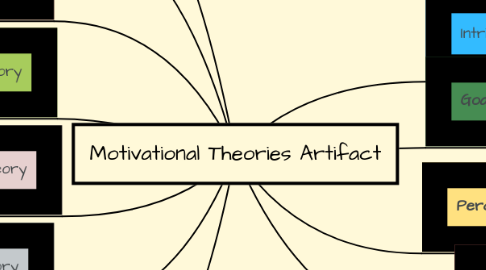Motivational Theories Artifact
by brittany rena


1. Reinforcement Theory
1.1. Used to explain all behavior
1.2. behaviors are caused by external stimuli
1.3. cause/effect actions
1.4. external rewards
2. Classical Reinforcement Theory
2.1. creates behavior patterns
2.2. positive reinforces increased producing something pleasant
2.3. op. conditioning
3. Social Learning Theory
3.1. focuses on the CAUSE of reinforcement
3.2. reinforcement is influential based on needs of learner
3.3. LOC- where and how reinforcement originates
3.3.1. internal LOC
3.3.2. external LOC
4. Attribution Theory
4.1. People want to understand themselves, their environment and interactions of them all
4.2. percetions
4.3. common performance attribution
4.3.1. ability
4.3.2. effort
4.3.3. excuses
5. Expectancy Value Theory
5.1. a person will approach or avoid a task
5.2. learners focus on expectations of rewards
5.3. values are important
5.3.1. low or high
5.4. emotions are influential here
5.5. 2 conscious variable factors
5.5.1. perceived probability
5.5.2. incentive value of success
6. Convington's/Self worth Theory
6.1. people naturally want to feel a sense of self worth
6.2. peoples appraisal of thier own value
6.3. self esteem
6.4. competency/incompetent
6.5. self confidence is key because being able to succeed is an essential ingredient for effective learning
7. Social Cognitive Theory
7.1. the fact that people think affects how they behave
7.2. expectations vs. personal opninions
7.3. Self Efficacy
7.4. achievement anxiety
7.5. Vicarious Learning
7.6. self regulation
8. Intrinsic Motivation
8.1. Keller's Theory
8.1.1. effort
8.1.2. performance
8.1.3. consequences
8.2. C's Theory (Flow like)
8.3. challenge
8.3.1. clear goals but requires investment
8.4. skills
8.4.1. efforts needed to apply to goal
8.5. Balance of these 2= achievable challenging BUT realistic goals
8.6. flow+ because it symbolizes development= +self esteem and personal complexity
8.7. Feedback= allows individuals o measure effort
8.8. RESULT= Intrinsic behavior is driven by personal rewards;motivation to engage in behavior arises from within
9. Goal Theory
9.1. learning influences level of a students intrinsic motivation
9.2. task involvement
9.2.1. incompetence/competence level can play a role
9.3. approach/ avoidance
9.3.1. avoiding failure
9.4. RESULT= goals should be specific and clear but realistic and challenging which includes self esteem and commitment
10. Perception of Ability
10.1. confidence in ability
10.2. Ability= level of performance
10.2.1. concepts
10.2.2. entity[stable trait]
10.2.3. instrumental [ability here is more task specific
10.3. Self worth Theory
10.3.1. naturally maintain self worth
10.3.2. assessing ability perceptions- behavior=info. on confidence in their ability
10.4. RESULT= SELF CONFIDENCE yields major ingredient for effective learning
11. Andragogy
11.1. Malcolm Knowles Stance
11.1.1. adults learn differently than do children
